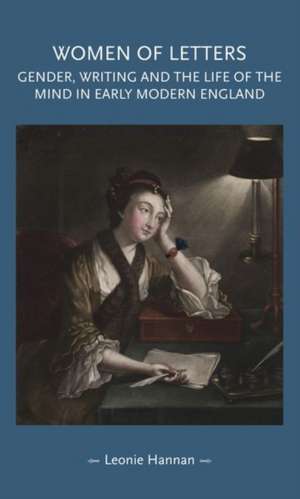Women of Letters: Gender in History
Autor Leonie Hannanen Limba Engleză Paperback – iul 2018
Din seria Gender in History
- 23%
 Preț: 536.31 lei
Preț: 536.31 lei -
 Preț: 204.49 lei
Preț: 204.49 lei -
 Preț: 108.05 lei
Preț: 108.05 lei - 5%
 Preț: 662.59 lei
Preț: 662.59 lei -
 Preț: 154.93 lei
Preț: 154.93 lei -
 Preț: 280.06 lei
Preț: 280.06 lei -
 Preț: 154.93 lei
Preț: 154.93 lei - 23%
 Preț: 537.08 lei
Preț: 537.08 lei - 23%
 Preț: 537.67 lei
Preț: 537.67 lei -
 Preț: 246.55 lei
Preț: 246.55 lei -
 Preț: 206.85 lei
Preț: 206.85 lei -
 Preț: 223.44 lei
Preț: 223.44 lei -
 Preț: 205.47 lei
Preț: 205.47 lei -
 Preț: 247.47 lei
Preț: 247.47 lei -
 Preț: 205.86 lei
Preț: 205.86 lei -
 Preț: 154.93 lei
Preț: 154.93 lei -
 Preț: 108.39 lei
Preț: 108.39 lei -
 Preț: 207.71 lei
Preț: 207.71 lei -
 Preț: 231.87 lei
Preț: 231.87 lei -
 Preț: 224.60 lei
Preț: 224.60 lei -
 Preț: 282.58 lei
Preț: 282.58 lei -
 Preț: 224.60 lei
Preț: 224.60 lei - 23%
 Preț: 721.29 lei
Preț: 721.29 lei -
 Preț: 222.08 lei
Preț: 222.08 lei -
 Preț: 235.43 lei
Preț: 235.43 lei -
 Preț: 223.61 lei
Preț: 223.61 lei -
 Preț: 221.70 lei
Preț: 221.70 lei -
 Preț: 281.42 lei
Preț: 281.42 lei -
 Preț: 342.00 lei
Preț: 342.00 lei - 23%
 Preț: 722.17 lei
Preț: 722.17 lei - 23%
 Preț: 740.37 lei
Preț: 740.37 lei - 23%
 Preț: 743.24 lei
Preț: 743.24 lei - 23%
 Preț: 719.65 lei
Preț: 719.65 lei - 23%
 Preț: 720.56 lei
Preț: 720.56 lei -
 Preț: 281.20 lei
Preț: 281.20 lei -
 Preț: 278.70 lei
Preț: 278.70 lei -
 Preț: 221.49 lei
Preț: 221.49 lei -
 Preț: 278.70 lei
Preț: 278.70 lei - 23%
 Preț: 737.07 lei
Preț: 737.07 lei - 23%
 Preț: 720.56 lei
Preț: 720.56 lei -
 Preț: 224.97 lei
Preț: 224.97 lei -
 Preț: 223.99 lei
Preț: 223.99 lei
Preț: 260.01 lei
Nou
Puncte Express: 390
Preț estimativ în valută:
49.76€ • 54.03$ • 41.80£
49.76€ • 54.03$ • 41.80£
Carte tipărită la comandă
Livrare economică 19-25 aprilie
Preluare comenzi: 021 569.72.76
Specificații
ISBN-13: 9781526127198
ISBN-10: 1526127199
Pagini: 216
Dimensiuni: 138 x 216 x 28 mm
Greutate: 0.27 kg
Editura: MANCHESTER UNIVERSITY PRESS
Seria Gender in History
ISBN-10: 1526127199
Pagini: 216
Dimensiuni: 138 x 216 x 28 mm
Greutate: 0.27 kg
Editura: MANCHESTER UNIVERSITY PRESS
Seria Gender in History
Descriere
Women of letters writes a new history of English women's intellectual worlds using their private letters as evidence of hidden networks of creative exchange. The book argues that many women of this period engaged with a life of the mind and demonstrates the dynamic role letter-writing played in the development of ideas. -- .
